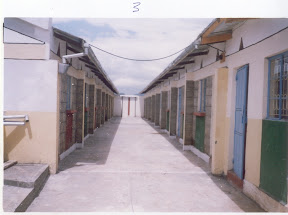 For those of you who have not known me long, you may not have known me long-but you do know that I am crazy about letting others know why they should be doing business in Africa. But people are imperfect, as I wholeheartedly admit that I am an example of human imperfection. It has occurred to me that sometimes in my zest for talking about Africa's business environments, I may tend to speak in a very general sense. But maybe if you have been on the receiving end of such a conversation, and you have said to yourself-"what type of business in Africa?" or "Africa, I thought that people only go there to help the needy".
For those of you who have not known me long, you may not have known me long-but you do know that I am crazy about letting others know why they should be doing business in Africa. But people are imperfect, as I wholeheartedly admit that I am an example of human imperfection. It has occurred to me that sometimes in my zest for talking about Africa's business environments, I may tend to speak in a very general sense. But maybe if you have been on the receiving end of such a conversation, and you have said to yourself-"what type of business in Africa?" or "Africa, I thought that people only go there to help the needy".
Well, I am taking this opportunity to go a different route. Export oriented businesses in Africa are generally what I am referring to when I talk about doing business there. An industry that I am interested in learning more about is business process outsourcing.
Coincidentally, I just so happened to come across a website which relates to this very topic. After finding it, my next move was to learn more about the entrepreneur sharing this information. As fortune would have it, she is a business person from Kenya and I believe that her company is a poster child for both outsourcing to Africa and also for export-oriented African businesses. Because her story sort of fits into more than one category this is not the Profile format that I have used over the last several weeks. In essence, this is more like publicity for her company and the Africa's business outsource industry itself.
Mugure Mugo is the entrepreneur that I am referring to and her business is called Preciss Patrol. Her company provides online research for internet content developers. Though, I have never personally done business with Preciss Patrol, there is a US-based business person, James Bacon, who has. Here's what he says of doing business with PrecissPatrol of Kenya:
"We couldn’t shake hands over the Internet. I couldn’t even look her in the eye. But Mugure inspired confidence. Her command of written English was better than that of most Americans. She quickly grasped what I was looking for. And she stayed on top of things: She did everything she said she would, and she did it when she said she would. Despite the seven-hour time difference between Richmond and Nairobi, our extended work days overlapped by several hours. I thought things would work. We had a deal."
Courtesy of Bacon's Rebellion
Oh, I think that Miss Mugo gives a much better explanation of business outsourcing than I do. Here it is:
"Some of the services most commonly outsourced to developing countries include professional services such as:
*Accounting
*Architecture
*Construction engineering
*Customer support
*Internet research
*Software development
*Web site design and maintenance
Also popular are information processing services such as:
*Data capture and processing
*Translation services
*Transcription services such as legal and medical transcription
*Secretarial services
*Claims processing such as health insurance claims processing
*Mailing list management
*Text keying
Over the years, there has been a change in the type of work that developed-country firms have been willing to outsource. There has been a shift from outsourcing of clerical type work, to more skilled, professional type of services.
If charted on a scale, outsourced projects will usually fall within three categories:
- Level 1 – routine clerical work, usually requiring only basic skills. This would include data processing and order taking.
|
- Level 2 – technical work requiring some level of technical training such as call centers and other forms of customer support.
|
- Level 3 - professional work requiring training and certification in a particular area such as market research, accounting, architecture and software development.
|
Why developing countries?
Reasons why US and European firms are increasingly partnering with firms in developing countries include the following:
Ability to obtain skilled labor for positions that would otherwise attract less qualified staff in developed countries. For instance, companies outsourcing their customer support function are able to obtain university-graduate-level staff in developed countries, who are usually willing to take on such assignments.
Lower labor costs. Contracting companies are able to obtain 30% – 40% cost savings as labor costs are considerably lower in developing countries.
Differences in time zones – this is especially important where 24 hour service is required by the contracting firm. A company in Africa or Asia, for instance, may take on work during hours when their US clients have closed for the day.
Improvements in some areas of developing economies have also led to their increased ability to attract work from abroad. Some of these include:
Improvements in telecommunications infrastructure – in Africa for instance, improvements in telecommunications infrastructure and other necessary services such as power and transportation have been key in enabling African firms source work from abroad
Improvements in educational standards – countries such as India and Kenya have a large population of well trained, English speaking professionals
Accessibility – improvements in air travel in many of these countries have encouraged foreign firms to outsource work to them. In some instances, contracting firms may require to visit locations where they have established working relationships with local firms.
It is now becoming clear that for many outsourcing firms, what began close to 25 years ago as a cost-cutting measure has evolved into an important way of achieving efficiency within the organization.
It is expected that in the next few years, the relationship between contracting firms in developed economies and firms in Asia, Africa, The Caribbean and Latin America will continue to evolve, and to foster partnerships that will be beneficial to both parties in the long run."
Courtesy of va newswire
If any of you are wondering if this post is sponsored it's not. I am recommending PrecissPatrol to anyone having online research needs simply because I believe in what Mugure Mugo is doing.
Of course, I love your comments. But, if you can't comment at this particular time- but would like to let us know that you were here; please sign and View my guestbook
Read More...
Summary only...












 They were actually born both in Africa, Dr. Lartay in Ghana and Dr. Graham in Nigeria. Likewise, they each came to America to complete their graduate degrees and eventually made America* their homes. They each have strong organic chemistry backgrounds and have worked as executives in the pharmaceuticals industry. Starting a pharmaceutical company,
They were actually born both in Africa, Dr. Lartay in Ghana and Dr. Graham in Nigeria. Likewise, they each came to America to complete their graduate degrees and eventually made America* their homes. They each have strong organic chemistry backgrounds and have worked as executives in the pharmaceuticals industry. Starting a pharmaceutical company, 





